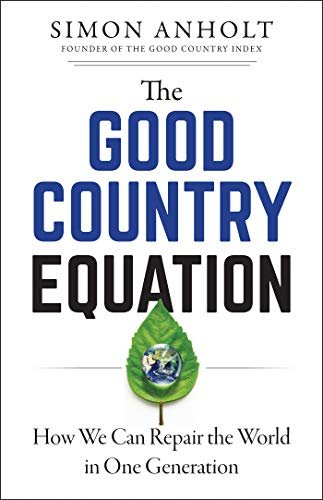Going by the words of French-Romanian playwright Eugene Ionesco, “It is not the answers that enlighten but the questions”, Simon Anholt’s book titled “The Good Country Equation: How We Can Repair the World in One Generation” is an apt response to a prominent question faced by the planet- “Why does not the World work?”
Presented in the form of an autobiographical travelogue, the book weaves the personal and the political together in a series of anecdotal chapters. Through fascinating first-hand accounts with governments all over the world, Anholt, who has advised fifty- six countries on strengthening effective international engagement, has successfully laid out solutions for the complexities of mutual engagement between nation-states.
Anholt begins with the notion that the image of the nation determines its fate. Nevertheless, to further clarify, the Nation brand is not a product of effective propaganda. Propaganda, if worked upon generations, may work inward, but global propaganda is a myth. Therefore, uprooting the long-held beliefs and notions about a nation and planting new deliberate seeds of perception has to be an organic process. Citing references from his travels across the globe, Anholt has adequately demonstrated successful results in implanting an improved image for nations internationally.
Providing a unique perspective on nation-states across the world, Anholt has brilliantly divided the world into three timelines based on interactions amongst nations: Combat, Competition and now Co-operation. With numerous tried and tested methods to improve the nation’s image in the world, Anholt’s method has proved that the world’s behaviour needs to shift from competitive to co-operative, that all governments can cater inward self-interests while playing a useful role on a global level.
Although for most parts Anholt avoids placing much importance on the concepts and dynamics of Hard Power and Soft Power, he considers a unique identity to be of much importance for countries. He states “For smaller countries, identity is the indispensable means by which they will achieve growth. Countries that are not powerful need to be interesting”. However, is cultural heritage, something that citizens prize as much as they should? He states that the four basic appetites that a community needs for continuity are cultural appetite, intellectual appetite, spiritual appetite and animal appetite. But in today’s age, how many countries are actually capable of catering to cultural appetites and spiritual appetites? Without satisfying these two “our tummies are full, but our souls keep rumbling” says the author.
It is difficult not to notice the informality in his approach while dealing with international relations. Nuanced description of his travel and wit loaded excerpts from his interactions with leaders of countries from around the world make the book an interesting and easy read.
The book convincingly makes the case that the interest of the self lies in the interest of the whole, which translates to the fact that governments must look beyond their inward interests, that it is not a question of ‘if’ but ‘how much’ is a nation contributing to the world.
Nevertheless, the author has acknowledged that in order to seek reigning continuity, it is not outrageous for any government to place inward interests superior to global contribution. Addressing the same, Anholt argues that humanity exhibits “mild but highly pervasive form of endemic cultural psychopathy” when the interests of other nations are concerned.
Breaking the established norm of mono-culturalism, Anholt proposes multilateralism for a practical approach to improve its “Good Country Index”. This project of Anholt does not imply good in the traditional sense of moral value judgement but a thorough rating system which reflects what a particular nation is serving to the globe. This contribution is not necessarily transacted in terms of Hard Power.
Anholt has challenged the notion that the behaviour of a nation concerning another nation depends solely on bureaucrats, foreign ministers and uppermost government officials. For any nation to improve under the Good Country Index, a more effective contribution comes even from individualist sources, like mayors for instance as he says that “the future of international community lies in the hands of mayors and governors (more than) than monarchs and presidents.”
The selection of anecdotes by Anholt from his experiences not only serve for a nuanced characterization of a place but also enable the readers to delve on the varied issues faced by nations. Through his book, Simon Anholt has attempted to simplify the complex subject of how the world works by providing a holistic view of the world we are a part of. Thus, the book serves as both a call to awareness as well as a call to action from the grassroots level.
The time for the launch of this book could not be more opportune as nations across the world continue to look inwards to seek answers in the midst of a global health crisis. In many ways, the world had come full circle from the era when humanity was lived on a conjoined supercontinent to the interconnected world of today, where it collectively faces the consequences of wars, climate change, pollution, terrorism, mass migration, extremism, habitat loss, unemployment and of course, global pandemics.
Anholt’s ideas of a global co-operative society though appear to be a distant, utopian dream, but his social experiment in the form of Global Vote hints practical possibility that might yield results. If the book aimed at positing unique, practical, and innovative ideas on humanity’s shared future, then for most parts, it delivers.
Kuldeep Badlani is a writer and researcher. He has worked on non – fiction projects on Indian Music and Borderlands as Chief Assistant Director, and Researcher.




